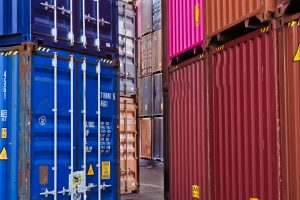
Evan Transportation is equipped to transport any of the 9 types of hazardous goods.
Evan Transportation is adept at transporting freight falling into unique categories, including the category of dangerous goods. What counts as hazardous materials in the shipping business might surprise the average mailer; fertilizer and lithium batteries (common to cellphones and laptops) are on the list. Does your freight fall into any of the nine classes of dangerous goods? Evan Transportation can deliver them according to standard safety regulations.
1. Explosives
Explosives are any material that has the capacity to produce a sudden chemical reaction if subjected to shock. There are six categories of explosives, varying in the type or size of explosion produced.
2. Gases
The three subcategories of gases are flammable gases, non-flammable and non-toxic gases, and toxic gases. Gases usually travel in a compressed vessel, and should any vessel accidentally burst, it could create projectile damage or suffocation.
3. Flammable Liquids
Flammable liquids have boiling points and flashpoints. A flashpoint is a temperature at which a flammable liquid may produce a gas that ignites a flame when it contacts air. These vapors are invisible.
4. Flammable Solids
Flammable solids are materials that are far more flammable than ordinary objects like paper or wood. There are three sub-classes: flammable solids that are especially sensitive, spontaneously combustible solids that combust with oxygen, and solids that combust when wet.
5. Oxidizing Substances
Oxidizing agents are hazardous because of their high oxygen content. If aflame, the fire is difficult to extinguish. Meanwhile, organic peroxides contain the fuel and the igniter in the same molecule, making the substance unstable and requiring careful monitoring.
6. Toxic & Infectious Substances
Toxic materials are poisonous. They hazard human health when a person consumes, touches, or breathes in the material. Infectious substances include any disease that can spread from person to person.
7. Radioactive Substances
Radioactive materials have an unstable molecular structure that changes randomly over time and is harmful to human health depending on the dose, type, and length of exposure. One must declare this type of cargo as radioactive, but labeling is not necessary.
8. Corrosives
Acids and alkalis make up corrosives, materials that can eat away flesh and other substances upon contact. As with other classes of dangerous goods, one must follow strict packaging and transportation rules for corrosives.
9. Miscellaneous
Miscellaneous objects include specialized goods that could explode, ignite, or harm human life that do not fall into the other eight categories. Evan Transportation can deliver any and all of these goods safely and according to regulations.
For All Your Trucking Needs
Follow us here at Evan Transportation to get more updates on driving tips and the trucking industry. Evan Transportation provides trucking and transportation services for clients throughout the Mid-Atlantic region. All of our drivers and staff are offered competitive salaries, benefits, and are guaranteed to be home every day. Interested in finding out more? Visit us online or give us a call at 443-673-3365. For even more information, visit us on Facebook, Twitter, Pinterest, and LinkedIn.
